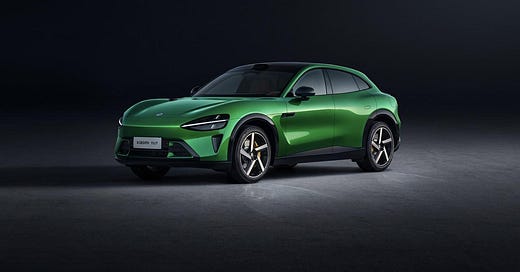Xiaomi Unveils YU7 Electric SUV Amid Safety Concerns and Market Ambitions
On May 22, 2025, Xiaomi officially introduced its second electric vehicle, the YU7, a luxury performance SUV aimed at challenging Tesla’s Model Y in China’s competitive EV market. The launch comes as Xiaomi navigates safety concerns following a fatal accident involving its SU7 sedan and strives to solidify its position in the rapidly evolving electric vehicle sector.
YU7: Xiaomi’s Foray into the Electric SUV Segment
The YU7 is a mid-to-large-size SUV measuring 4,999 mm in length, 1,996 mm in width, and 1,600 mm in height, with a wheelbase of 3,000 mm. This positions it larger than Tesla’s Model Y, which measures 4,750 mm in length and 1,921 mm in width. Xiaomi offers the YU7 in three variants: Standard, Pro, and Max.
Standard: Equipped with a single rear motor producing 235 kW, it accelerates from 0 to 100 km/h in 5.88 seconds and offers a CLTC range of 835 km, powered by a 96.3 kWh LFP battery.
Pro: Features dual motors delivering a combined 365 kW, achieving 0 to 100 km/h in 4.27 seconds, with a range of 770 km.
Max: Boasts dual motors totaling 508 kW, accelerating from 0 to 100 km/h in 3.23 seconds, and a range of 760 km, utilizing a 101.7 kWh NMC battery.
All variants support 800V fast charging, enabling the addition of 620 km of range in just 15 minutes. The YU7 also incorporates Xiaomi’s HyperOS, a panoramic “hypervision” display, and advanced autonomous driving capabilities powered by Nvidia’s Drive AGX Thor platform. Pricing details are expected to be announced closer to the vehicle’s market release in July 2025.
Safety Concerns Following SU7 Fatal Accident
The YU7’s debut is overshadowed by a fatal accident involving Xiaomi’s SU7 sedan. On March 29, 2025, three university students lost their lives when their SU7 collided with a concrete barrier on the Dezhou-Shangrao Highway in Anhui Province. The vehicle reportedly caught fire post-collision, and there were allegations that the doors failed to unlock, trapping the occupants inside.
Xiaomi confirmed that the SU7 involved was the Standard version, which lacks advanced autonomous driving features. The company stated that the vehicle’s collision warning and emergency braking systems were active but acknowledged limitations in obstacle detection. Xiaomi has pledged full cooperation with the ongoing investigation and expressed deep regret over the incident.
Xiaomi’s Position in China’s EV Market
Despite the recent setback, Xiaomi has made significant strides in China’s EV market. In April 2025, the company ranked ninth in the new energy vehicle (NEV) segment, with retail sales of 28,585 units, capturing a 3.2% market share. This performance places Xiaomi ahead of several established competitors, including Leapmotor.
The SU7 sedan, Xiaomi’s inaugural EV, has achieved over 258,000 deliveries since its launch in March 2024. However, the company faces challenges, including a reported 55% drop in new SU7 orders in April 2025 compared to March, attributed to safety concerns and customer dissatisfaction over product features.
Looking Ahead
Xiaomi’s introduction of the YU7 signifies its commitment to expanding its EV portfolio and competing in the luxury SUV segment. While the company has demonstrated rapid growth in the EV market, addressing safety concerns and maintaining consumer trust will be crucial for its sustained success. The upcoming launch of the YU7 in July 2025 will be a critical test of Xiaomi’s ability to navigate these challenges and establish itself as a formidable player in the global electric vehicle industry.




